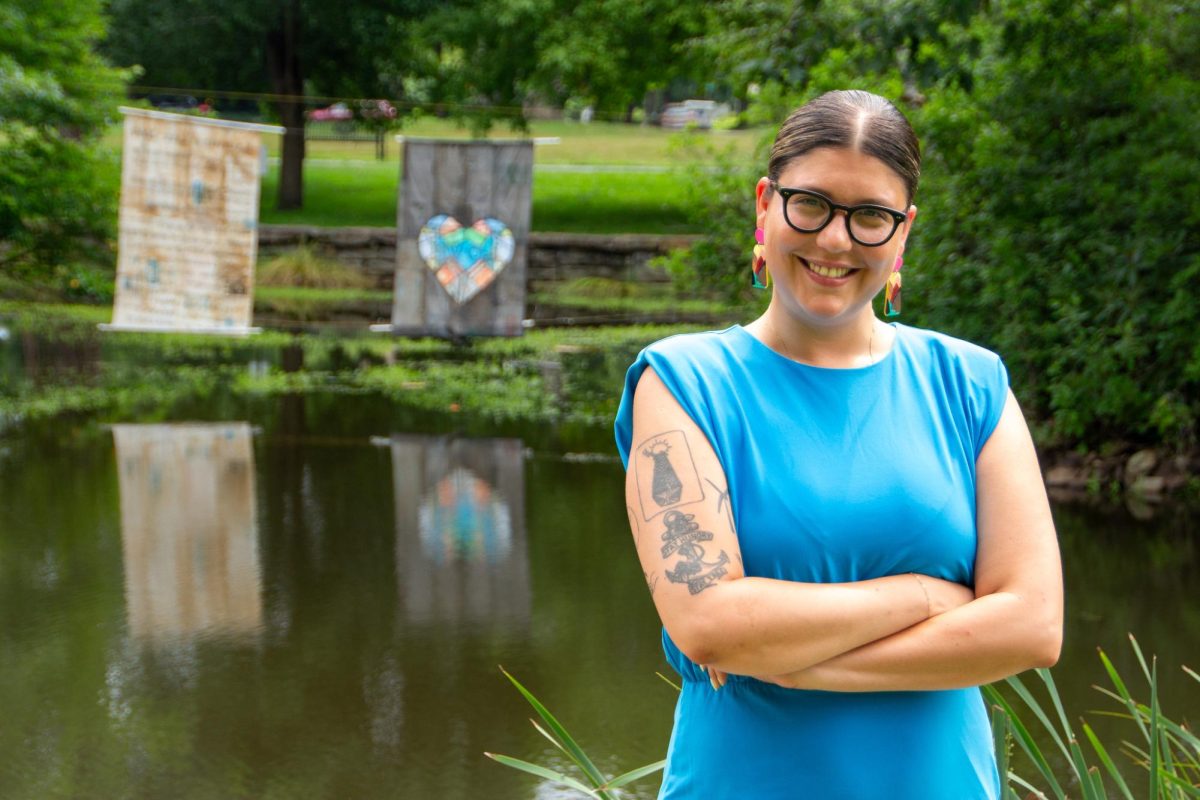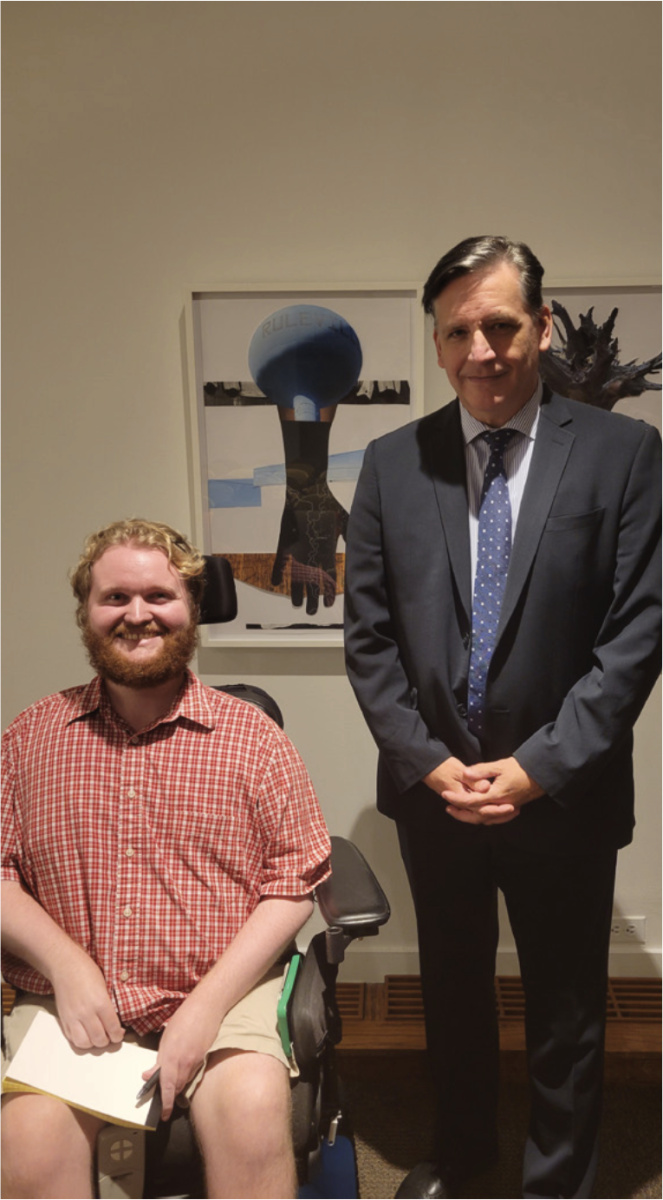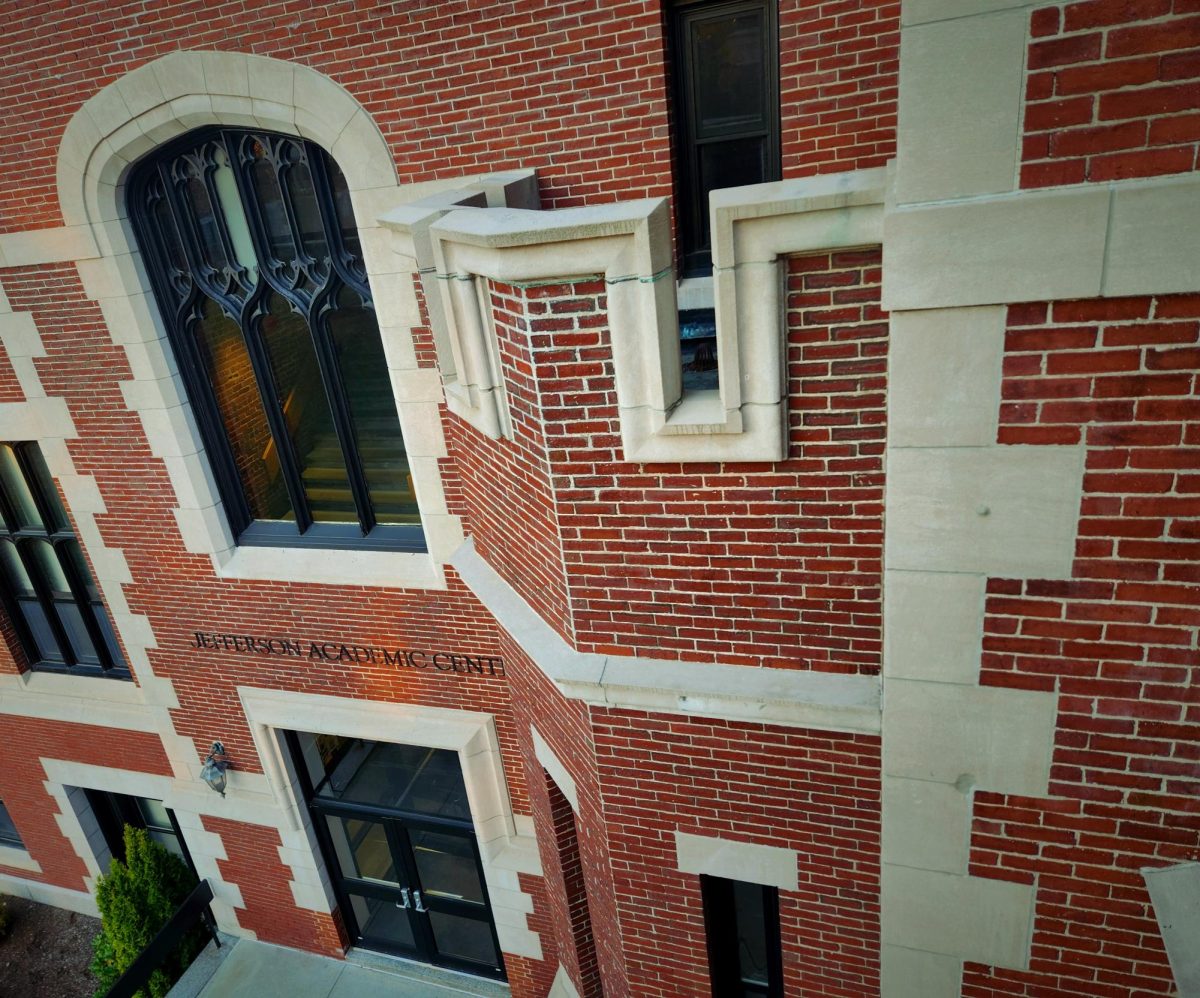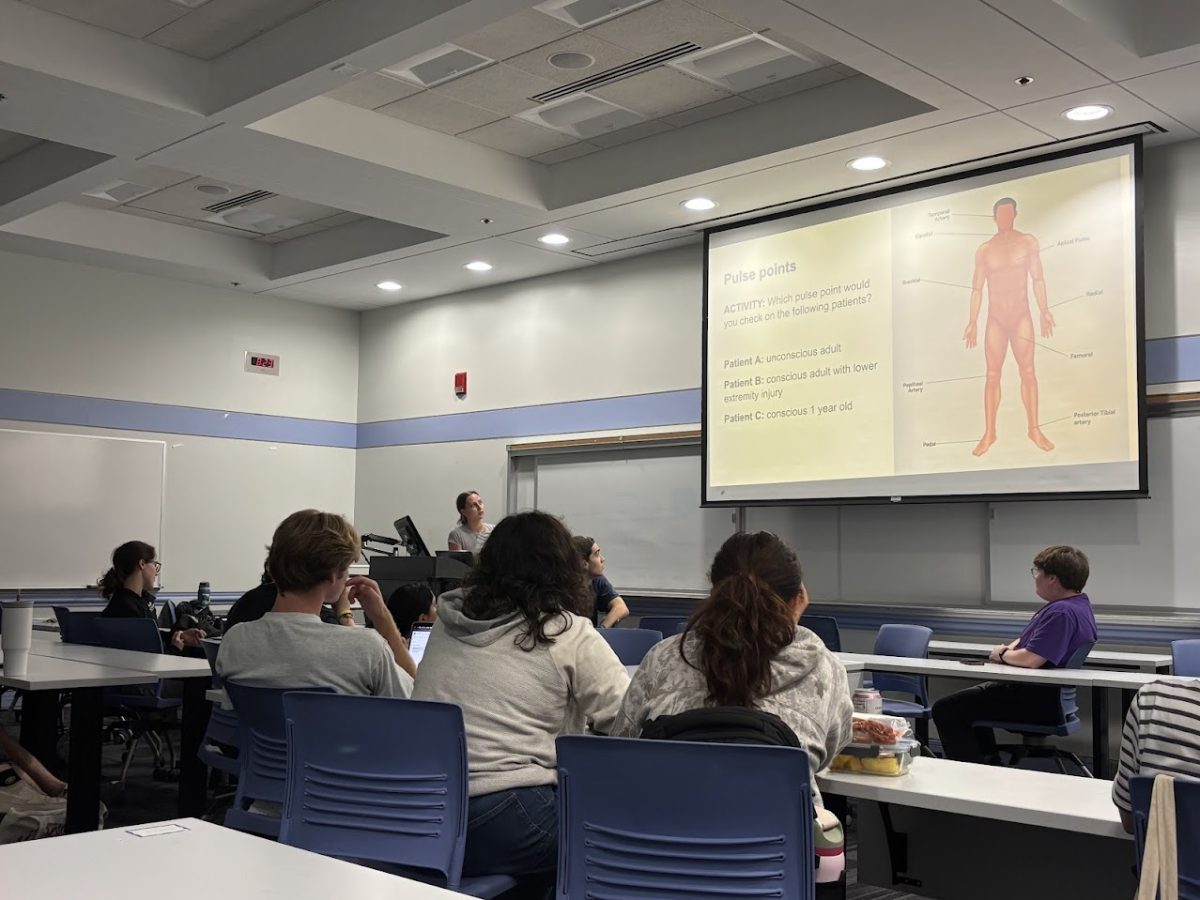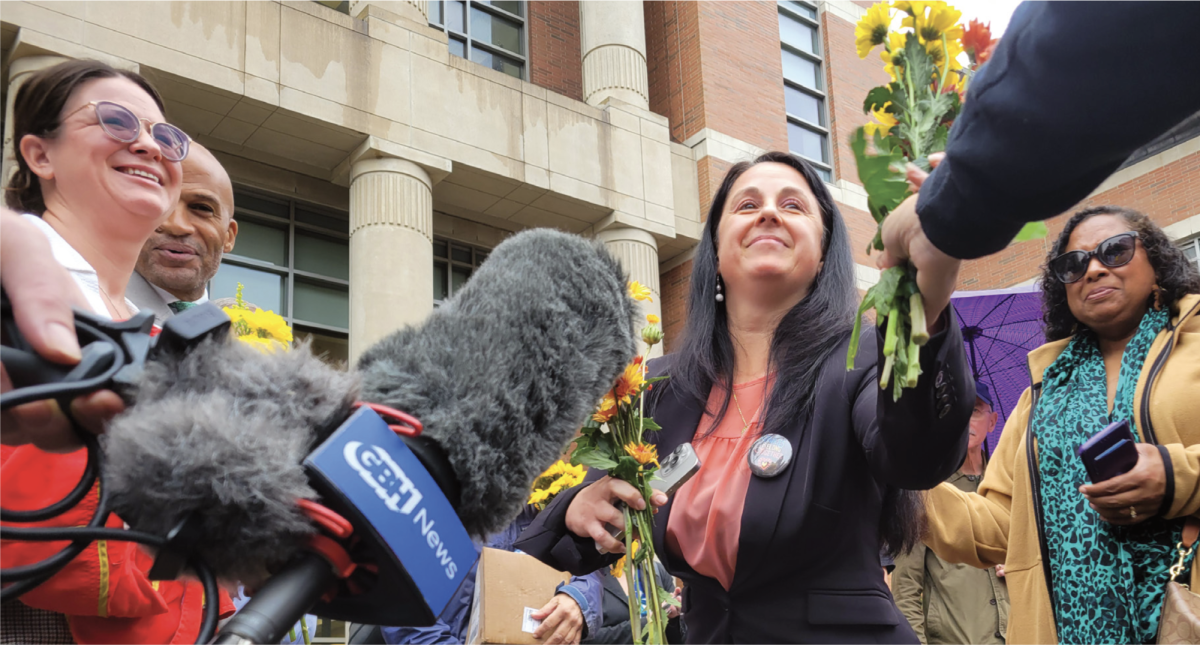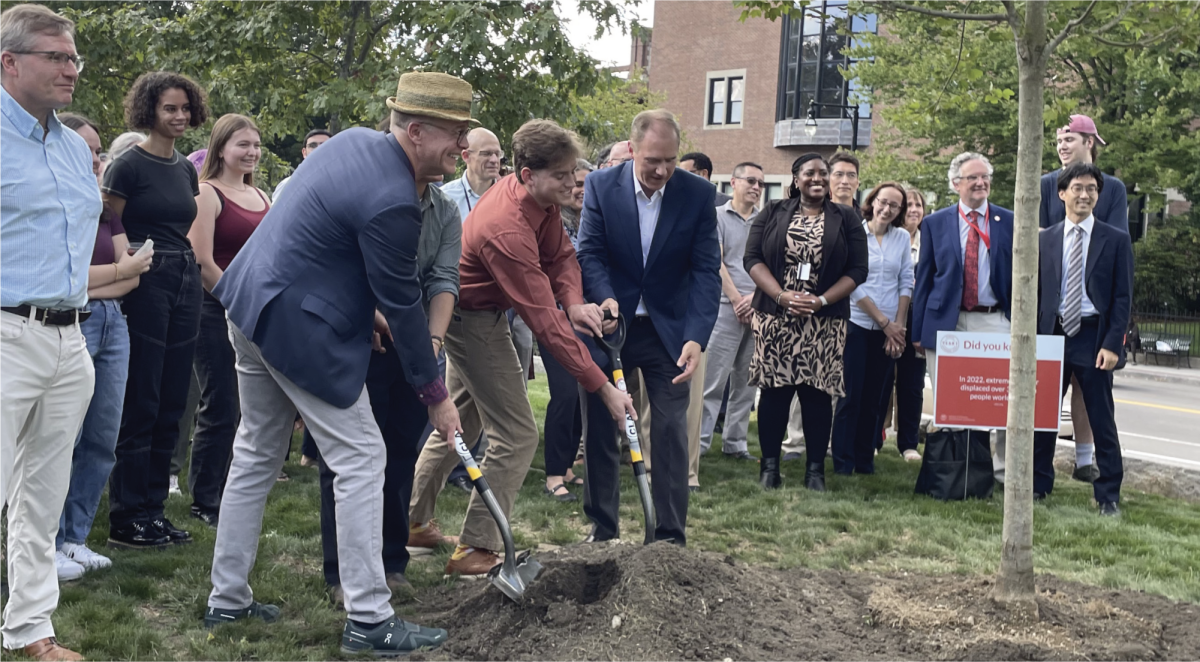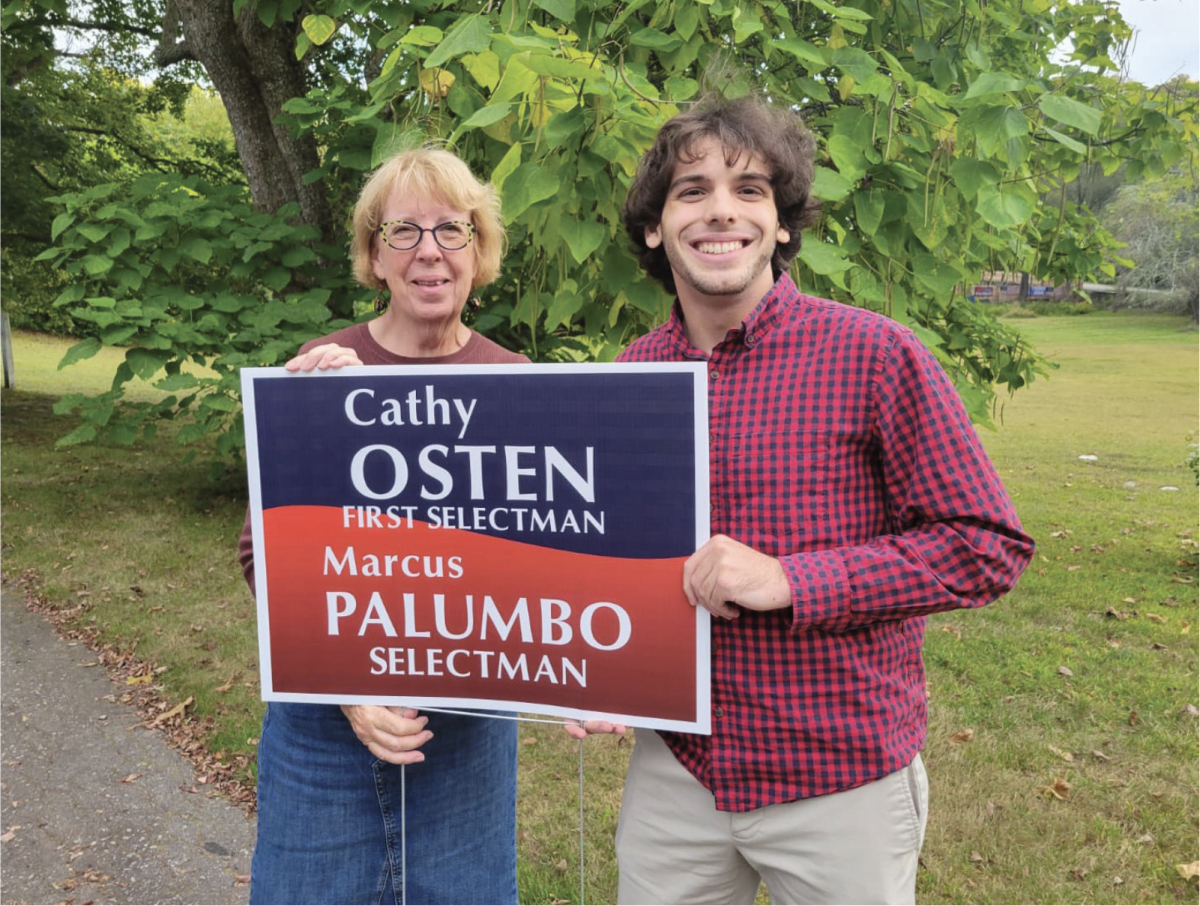To say that Domenica Perrone is busy is a serious understatement. Between her role as Director of Community Engagement and Volunteering at Clark University, membership on various community boards, and an ambitious campaign for Worcester City Council, Perrone’s professional schedule is brimming.
All that work is getting consistent recognition. In 2023, Perrone was named a Commonwealth Hero by the state’s Commission on the Status of Women, and listed by Worcester Magazine as one of the 20 “Women to Watch” in the city. In 2022, she was placed on the Worcester Business Journal’s “40 Under Forty” list.
Perrone is also a member of the boards of Edward Street (a Worcester-based early education advocate), the Worcester Public Library Foundation, the League of Women Voters, and United Way – and she only recently stepped down from a board appointment with the Main South Community Development Corporation.
Perrone does not compromise, however; she refuses to split her time. In an interview with The Scarlet over coffee at Annie’s Clark Brunch, it became clear that Perrone brings the same energy, clarity, and intentionality to all of her work.
That drive is largely informed by her background, Perrone explained. Born in Ecuador, she immigrated to the United States with her mother and two older sisters at a young age following the death of her father. She grew up in northern New Jersey, “living always in an apartment with strong Hispanic women in a multigenerational household,” Perrone said – her grandmother lived with them at the time.
Perrone said she had always been aware of the structural inequities around her, especially when her sisters warned her not to “become another statistic,” imploring her to go to college. Perrone landed at Emerson College in Boston, receiving her bachelor’s in 2014. And it was in Boston that Perrone discovered how best to identify and describe the injustices around her.
“In my college classes, I would see very few people who were like myself,” said Perrone. “Very few immigrants, very few Latinos.”
She saw it first-hand outside of Emerson, too: working with an early education program called Jumpstart, Perrone was placed at an underfunded preschool in South Boston. “I realized, ‘oh, this is where these inequities start,’” Perrone said.
After graduation, Teach for America brought her to a large public school system in Texas, where the problems were even more apparent. “There was policy and systems at play… that prevented my students from succeeding,” said Perrone. “That felt very frustrating when they would inevitably drop out.”
With her diverse experience, systemic inequity is always front-of-mind for Perrone. “That has always elevated my thought process to wanting to make a larger impact,” she said.
Discovering Community Engagement
Perrone has a standard answer to the question of why she chose Worcester as her next home: “Clark brought me to Worcester, but Worcester got me to stay.” She returned to Massachusetts in 2017 to start both an MBA and a master’s in Community Development and Planning at Clark. “At the time, I wanted to do reproductive justice work because of what I was seeing in Texas,” she said.
At first, Perrone wanted to learn how to run a nonprofit; she quickly discovered that Worcester has many. “Everybody in Worcester is doing work and has been doing work for 20 years, maybe longer,” she said. “I realized that we don’t need more nonprofits or new ideas – but I have groups in the community that I can learn from and support,” said Perrone.
Perrone got engaged across the city, but first focused her time and energy as program director at Worcester State University’s Latino Education Institute. That was where she met her now-Associate Director at Clark, Carla Orellana, who grew up in Main South. Later, in 2019, Perrone was hired full-time as a project manager at Worcester’s Department of Health and Human Services. That was where Perrone decided she eventually wanted to run for city council.
She completed her graduate degrees at Clark in 2020. Her time here was foundational, Perrone said, for learning the ins and outs of coalition-building – an experience every Clarkie should have, she argued.
That experience helped her define her current role, which she took on in spring of 2022. “We’re not here to reinvent the wheel,” she said. “We don’t know any better than the people who have been living here for a long time.”
With that understanding, Perrone said that Clarkies should ask themselves how they apply their “unique skills, privilege [and] talents” to support local organizers in their missions. For her own part, Perrone sees herself as “an equitable matchmaker,” skilled at “identifying gaps and needs and trying to use our resources to fill those gaps and needs where we can.”
Perrone’s current role had been vacant for three years before she was hired. A job search started before the pandemic was later stalled by it, she explained.
What Clark Can Offer
Working in public health during the pandemic made it very clear to Perrone how the city’s different colleges were engaging with the community. “I saw a lot of people from different colleges, but not from Clark” at HHS events, said Perrone. The medical schools were there of course, but so were students from Worcester State. “Even WPI became present,” she added. “Being able to understand what each institution in Worcester provides to Worcester is really interesting,” she said.
“Clark’s biggest strength, in some ways, is the students that come here,” said Perrone. The students here, she observed, are intrinsically concerned with doing right by the community. “But where we lacked was in structural resources,” she said.
Perrone added that the current administration – led by President David Fithian – has demonstrated a real commitment to community engagement. “The evidence shows that [they] realize we have work to do, and they are trying to put the resources behind that.” Those efforts included both funding and trust in her office and her mission, Perrone said. It also included investing in new software that tracks community engagement and allows local organizations to post openings. “Even if we don’t have all the answers right now, I can say everybody’s talking about it,” she said of the conversation around engagement.
In her capacity as director, Perrone focuses primarily on connecting faculty to community organizers, and vice versa. Carla Orellana, the office’s Associate Director, is focused more directly on student engagement. Perrone also helps faculty to integrate engagement into their curricula, which can include hosting and compensating lecturers.
Her ultimate goal as Director is to make community engagement at Clark self-sustaining: “when I leave, [CEV] should not fall apart,” she said. To accomplish this, she argued, the Clark community has to make its own connections with Worcester, built by faculty or student organizations. Perrone imagines a future where community engagement is developed through “systemic structures” built around the pre-health society, for example. She also floated the idea of a service-based graduation requirement.
Family Health Center (the nearest primary care facility, on Queen Street), for example, recently contacted Perrone asking for help. “They said they were looking for support in doing a needs assessment for homelessness. I said, perfect. I know just the faculty member to connect you with. And now they’re doing it.”
Even with faculty connections growing, the student body’s “grassroots” inclination, as she describes it, has its own inequities that go beyond not showing up at vaccine clinics. Some organizers see Clarkies all the time, while others “have never been touched by Clark,” Perrone said. This can lead to “community fatigue,” she explained: where local organizers are “inundated by emails” and frustrated by students who don’t do their research, or expect the community partner’s schedule to fit their own. “That would be too much Clark involvement in ways that don’t make sense,” she said.
Perrone explained a simple formula for success. With Clark being centrally-located in Main South, she noted, “it’s about a ten-minute walk from Worcester’s largest drop-in homeless shelter,” and not far from several health clinics. And with psychology as Clark’s most popular major, Perrone questioned why more students weren’t involved with behavioral health and harm reduction.
“Where is the disconnect taking place? We’re perfectly located to do that work, but for whatever reason we’re not doing it,” she lamented.
She acknowledged that campus-wide interest is strong, and that students may not know where to start. That’s where Perrone comes in – “I know how to do that!” she said. “If you don’t know how to get involved, reach out to the office,” she explained. Students can schedule a one-on-one meeting to learn more.
On Civic Engagement and Running a Campaign
Perrone announced her candidacy for one of the six at-large seats in Worcester’s City Council in November of last year. Since then, she said, she and her team have knocked on over 4,200 doors. Canvassing in this way, she said, is essential for progressive candidates. “Not everyone door knocks, but we do,” she said.
When constituents open the door, their two big concerns are housing and education, Perrone said. “By housing I mean ranging from property taxes to, I don’t feel safe in my neighborhood,” she explained. She has also found that many residents share her concerns on education, as a believer in upstream public health solutions. “You can’t get more upstream than education – we need to fully fund our education system,” she said.
If elected, Perrone plans to continue focusing on addressing inequities. On housing, Perrone hopes for a repeal of the statewide ban on rent control, a policy which she would support implementing in Worcester. She would also ask the city manager early on to draft a plan for addressing early education and care inequities, alike a recent policy adopted in Boston. Perrone would also like to see restrictions on street vending and food trucks loosened to help small businesses get started.
“I want to see life in this city,” Perrone said. “I want to see a city where young people who are considering staying in Worcester have ways of building relationships outside of their families,” she said.
In her opinion, the current state of municipal government is the biggest barrier to implementing these policies. “As a constituent, I would want a mayor that I vote for that has more authority,” as opposed to the currently high-powered (and appointed) city manager, she said.
Perrone sees her progressive campaign as part of the solution. “Ultimately, the goal is to flip enough seats to actually win majority votes” in priority areas, she said. But right now, progressives lose regularly. “That can be very frustrating and exhausting for progressive councilors,” she said. “We should never take people who are sacrificing their personal lives to run for office on these values for granted,” said Perrone. “They could just as easily not run, and that would be a shame.”
She referred specifically to two councilors as mentors, both Clark alumni: Thu Nguyen and Etel Haxhiaj. “I would not have chosen to run or known how to run and file if it weren’t for them,” Perrone said. She also credited other community elders for inspiring her and keeping the campaign grounded. Perrone particularly appreciated the vast knowledge base helping her understand “the complexities around organizing for women of color in this city,” she said. “It’s beyond our time.”
Perrone has cultivated a diverse campaign team that synthesizes that knowledge. It includes the Pride and Latinx communities, as well as college friends: “it includes people I went to Clark with that are experts in GIS and know how to cut turf,” Perrone explained. She met her campaign manager, fellow Clarkie Hallie Blashfield, in her first year in the CDP program. “It is so important to not be running by yourself,” Perrone said. “What did Bernie say? Not me, us? Words to live by.”
Perrone’s endorsements range from Teamsters Local 170 (members include Clark grad. workers), the Educational Association of Worcester (largest local of the Mass. Teachers Assoc.), and the Carpenters and SEIU locals to the Sierra Club and Planned Parenthood.
Getting engaged can go beyond voting, she emphasized. There will never be a shortage of political campaigns for undergraduates to get involved in, said Perrone. But the single most important action Clarkies can take, she said, is just to show up.
“Clark is really good about talking and theory and reflection, but all of that goes to waste if you don’t physically show up to community events,” she said. It could be a fun pastime, she said, or it could be “showing up to a City Council meeting and advocating for the exact same things you’re talking about in class.”
“I want Clark students to know that their opinions and voices matter,” she said. “You are living here for four or five years at a time. You have intentions that are in the right place, and I want your actions to reflect that,” said Perrone.

